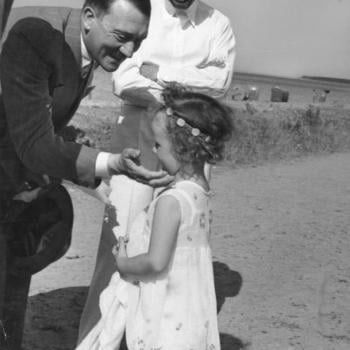Two Kinds of Christian Fundamentalism
*Note: If you choose to comment, make sure your comment is relatively brief (no more than 100 words), on topic, addressed to me, civil and respectful (not hostile or argumentative), and devoid of pictures or links. Know that this is not a discussion board; do not misuse it to attempt to promote your own, alternative worldview, philosophy, theology, etc.*
I’ve been fascinated to the point of near obsession with Christian fundamentalism for much of my life. I can remember my involvement in Youth for Christ when I was only 14 or 15 (and beyond that). I was impressed by the diversity of Christians who attended and were involved in our local YFC clubs and “rallies.” I discovered for the first time that non-Pentecostals could be passionately Christian, evangelical (in the non-political sense), even Spirit-filled. That was eye-opening to me.
However, I also knew, I don’t remember exactly how, possibly through school, that there were conservative Protestant Christians in our city, mostly but not exclusively Baptists, who eschewed Christian fellowship with almost all other Christians because they/we believed some slightly different things than they. I discovered that some of them actually thought Billy Graham was apostate or at least corrupted theologically and in terms of practice because he allowed allegedly liberals (mainline Protestants pastors) and Catholics to cooperate with his “crusades.” I remember seeing some fundamentalist Baptists from a local GARB (General Association of Regular Baptist) church picketing a Billy Graham crusade.
I asked my uncle, then president of our little Pentecostal denomination, about the difference between fundamentalists and “us.” That was when I was beginning to discover that at least SOME of “us” were much like “those fundamentalists.” I got to know some of “us” who, for example, thought Catholics could not be Christians (“They worship food”) and believed that anyone who believed in any sort of evolution could not be Christians. Only two things seemed to separate “us” from “them.” First, we loved Billy Graham. Second, we spoke in tongues while they believed speaking in tongues was “of the devil.” Well, there were probably some other differences. But those were the first ones I learned.
Because we were Pentecostals, they wouldn’t have any fellowship with us of any kind. For example, we would join in with non-Pentecostal evangelicals in things like “Union Thanksgiving Services” and “All City Easter Sunrise Services,” and etc. They wouldn’t. They stood apart for what I began to think of as fairly minor, even strange, reasons. From their point of view, for example, we were “impure” spiritually and doctrinally because we had women pastors, women church planters, women evangelists.
All of that set me on a life-long (from about the age of 15 or so) journey to try to understand the meaning of “fundamentalism.” My uncle insisted that “we” were NOT fundamentalists but “conservative evangelicals.” We belonged to the National Association of Evangelicals (NAE); “they” did not. They had their own “umbrella” organizations, networks of churches, such as the American Council of Christian Churches founded by fundamentalist leader Carl McIntire. However, strangely, “we” read “their” books and magazines such as John R. Rice’s “The Sword of the Lord.” I was confused. I still am somewhat confused!
Then I read then Fuller Seminary president E. J. Carnell’s excellent little book “The Case for Orthodoxy.” In it he described fundamentalism as “orthodoxy gone cultic.” I was beginning to understand the meaning of “cult” and could see at least two connections between fundamentalism and cultic religion—absolutism and authoritarianism.
Some scholars who studied Christian fundamentalism and wrote about it pointed to one main characteristic that, for them, anyway, separated fundamentalists from conservative evangelicals—“biblical separationism.” That means declining, nicely or not so nicely, to have Christian fellowship with any Christian(s) who are not “pure” in terms of doctrine and practice. Some fundamentalists went so far as to declare any modern Bible translation or paraphrase—than the King James Bible—apostate or at least spiritually and doctrinally corrupt. Other fundamentalists did not go that far but declined cooperate with or fellowship with fellow Christians (who they suspected of not being authentically Christian) who had fellowship with Catholics and “mainline Protestants.” That’s called “secondary separationism.”
Now all of that is background to my developing theory that there are two kinds of American Christian fundamentalists. (Here I’m setting aside the current political meaning of “fundamentalist Christian” which is an invention of the media but supported by some sociologists of religion and many journalists.)
Some American (and possibly other) Christian fundamentalists think of themselves as rational in their religious ideas. That drives them to produce ATTEMPTS in writing and speaking to harmonize all of scripture into something like a system of ideas. (They would call them “truths.”) To them, the Bible is a (read carefully here) “not yet systematized systematic theology”—whether they would put it that way or not. The “grandfather” of this kind of fundamentalism was Charles Hodge, the great president of Princeton Theological Seminary in the 19th century who produced what is, according to David Wells, “the stout and persistent theology” not really capable of being improved on. These “heirs” of Hodge (and later conservative Princeton theologians like B. B. Warfield and J. Gresham Machen) treat the Bible as a set of divinely delivered truths that need to be systematized to ward off heresies. Some systematic theology, usually like Hodge’s, becomes for them and their disciples the Bible rationally systematized and the foundation of all spiritual and doctrinal preaching and teaching. Anyone who disagrees with any part of the system, except possibly ecclesiology, is unworthy of Christian fellowship and worthy of harsh criticism and even verbal attack.
Other American Christian fundamentalists are not in the least interested in systematic theology and almost revel in what they consider the supra-rational nature of divine revelation in scripture. That is the fundamentalism I grew up in. True, we were not fundamentalists “like” the rigid, hard-core separatistic fundamentalists of the far-right Baptists (for example), but we did not think the Bible needed to be systematized. It just needed to be believed EVEN IF that included extreme cognitive dissonance. For these fundamentalists, the whole Bible is “that manuscript from heaven” (the title of one fundamentalist book) and attempts rationally to systematize it are attempts to impose human reason on what is essentially mysterious. When I asked my fundamentalist teachers and mentors how to reconcile portions of the Bible with each other I was harshly put down as trying to use reason on what is essentially beyond reason. The attitude they had toward my questions is expressed in a saying I learned in Germany: “Eat up, little birdies, or die.”
The second group of fundamentalists may produce and read books of doctrines, but they are not really systematic; they are just “handbooks” of true beliefs used for indoctrination. What Europeans call “dogmatics.” (Although some of those European “dogmatics” are quite systematic, such as Karl Barth’s “Church Dogmatics.”)
What makes both of these types of American Christian fundamentalist “fundamentalists?” (Many of them don’t admit to being that!)
First, they TEND to confuse their interpretations of the Bible, sometimes their extra-biblical doctrines, with the Bible itself. If you dare to question something they believe or teach you are treated as questioning the Word of God itself.
Second, they TEND to elevate very secondary doctrines to the status of essentials of Christian belief, packing “the gospel” (as a concept) with everything they believe. If you question one thing they believe, you are questioning the very gospel itself.
Third, they pretend to be absolutely certain of everything they preach and teach AND they preach and teach A LOT that is highly questionable. For example, for most of them, the “rapture” and dispensationalism OR five point Calvinism (or both).
Fourth, they draw back from Christian fellowship, cooperation, with fellow evangelical Christians (and other Christians) who disagree with them about almost anything.
True Christian fundamentalism is orthodox; they believe in the essentials of Christianity. In other words, the so-called “cults” that claim to be Christian are NOT fundamentalists even if they exhibit one or two characteristics of Christian fundamentalism. But it is “orthodoxy gone cultic.” It is absolutist, totalizing, authoritarian, and separatistic.
Why does any of this bother me? Because, increasingly, over the past decades, I have encountered God-fearing, Bible-believing, Jesus-loving evangelical Christians who devour fundamentalist literature without knowing it’s fundamentalist. And they get infected by the cultishness of fundamentalism. During a Bible study or adult Sunday School class or after a sermon they will say things like “But [fill in the name of a fundamentalist speaker and writer] says…and therefore you are wrong.” Often what I am wrong about is something I consider a minor and non-esssential point of doctrine.
So I will leave you with this very simple and even simplistic description of the difference between fundamentalist and liberal Christians.
There are, I believe, three categories of Christian beliefs—dogmas (essentials), doctrines (non-essentials but important to denominations), and opinions.
Fundamentalists TEND to empty the “opinion” category and move everything over into the “dogmas” category—sometimes allowing ecclesiology to fall into the “doctrines” category. In other words, they MAY have Christian fellowship with other fundamentalist Christians who believe differently about church polity. Liberal Christians TEND to empty the “dogmas” category and push everything over into the “opinions” category while holding fairly loosely to their own denominations’ ecclesiologies. We moderate evangelicals (and others) TRY to get the right beliefs into the right categories, avoiding over-populating any one category to the neglect of the others. It’s an ongoing task.

















